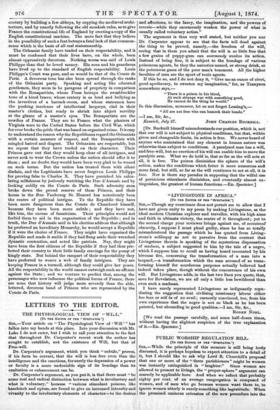LETTERS TO THE EDITOR.
THE PHYSIOLOGICAL VIEW OF " WEL."
[TO THE EDITOR Or THE " SPECTATOR']
Six,—Your article on "The Physiological View of Will ' " has fallen into my hands at this place. Into your discussion with Mr. Lake I do not enter, but I wish to call your attention to the fact that throughout Dr. Carpenter's recent work the author has sought to establish, not the existence of Will, but that of Free-will.
Dr. Carpenter's argument, which you think " subtile," proves, if his facts be correct, that the will is less free even than the intelligence and the emotions, for surely the depression of a power or faculty is a more undeniable sign of its bondage than its exaltation or enhancement can be.
Dr. Carpenter's argument, as you put it, is that there must "be some real and radical distinction between what is involuntary and what is voluntary," because "various stimulant poisons, like haschisch and opium, are found to give an increased intensity and vivacity to the involuntary elements of character—to the desires and affections, to the fancy, the imagination, and the powers of reverie—while they enormously weaken the power of what is usually called voluntary action."
The argument is thus very well stated, but neither you nor Dr. Carpenter appear to see that the facts tell dead against the thing to be proved, namely,—the freedom of the will, seeing that in them you admit that the will is so little free that a few grains of poppy-gum can enormously weaken its action. Instead of being free, it is subject to the bondage of various poisonous agents, be they the narcotics named, or strong drink, or the poisonous gases of the poor man's tenement. All the higher faculties of man are the sport of toxic agents.
If this be so, and I do not deny it, "Give me an ounce of civet, good apothecary, to sweeten my imagination," for, as Tennyson. somewhere says,—
" There is a poison in his blood,
At such strange war with something good, He cannot do the thing he would."
In this discussion, moreover, let us not forget Leasing's,— [Dr. Bucknill himself misunderstands our position, which is, not that our will is not subject to physical conditions, but that, within given and changeable limits, its action is free. We never heard of anyone who maintained that any element in human nature was otherwise than subject to conditions. A paralysed man has a will, and free-will, but no exertion of his will can enable him to move the paralytic arm. What we do hold is, that so far as the will acts at all, it is free. The poison diminishes the sphere of the will's action, makes the conditions which fetter it more numerous and more fatal, but still, so far as the will continues to act at all, it is free. Nor is there any paradox in supposing that the wilful use of pernicious stimulants diminishes, and eventually almost ex- tinguishes, the greatest of human functions.—En. Spectator.]






























 Previous page
Previous page